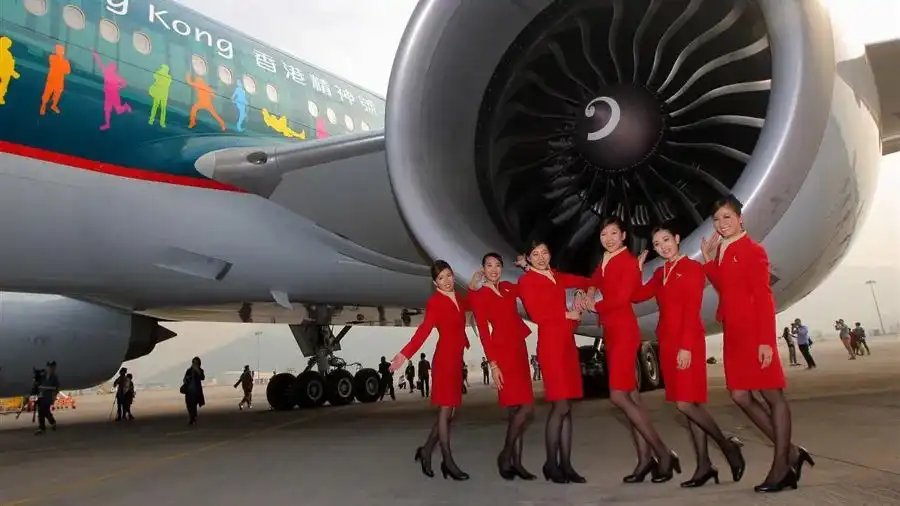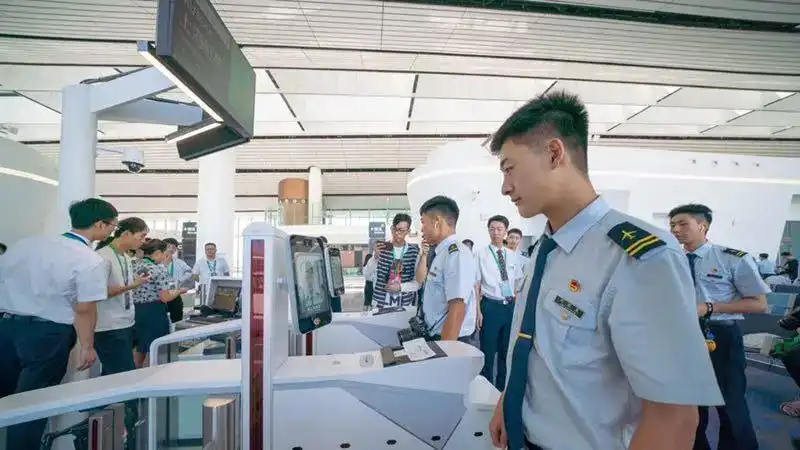Cathay Pacific's counterattack, inspiration from mainland airlines
The following article comes from Understanding the Sutra, written by Wang Li
 Understand the scriptures.
Understand the scriptures.
Finally waiting for you to come together to understand the scriptures

Recently, Hong Kong Cathay Pacific released its 2023 annual report, and its performance made its peers envious.
The financial report shows that in 2023, Cathay Pacific Group achieved revenue of HK$94.485 billion (approximately RMB 87.33 billion), a year-on-year increase of 85.1%; net profit of HK$9.789 billion (approximately RMB 9.06 billion), the best profit since 2010.
This also makes Cathay Pacific the most profitable airline in China, surpassing Spring Airlines, which has forecast profits of 2.1 billion to 2.4 billion yuan.
The three major state-owned airlines with large mainland fleets have not yet turned losses, and the Hong Kong civil aviation market has not yet recovered to 2019 levels. Against this background, Cathay Pacific took the lead in achieving a counterattack, which is somewhat unexpected.
So, what did Cathay do right?
Internally is changing, and external factors are also key
How does Cathay Pacific make money? The financial report shows that the significant improvement in performance is due to the significant growth in tourism demand in 2023, especially the rapid recovery of passenger transport data in the mainland market.
In 2023, Cathay Pacific's passenger revenue reached HK$55.951 billion, a year-on-year increase of 308.8%. Among them, the carrying capacity of the North Asian region, dominated by the mainland, increased by 534.7% year-on-year, and the passenger load factor increased by 23.6 percentage points to 78.4%, ranking first in growth rates.
Lin Shaobo, CEO of Cathay Pacific Group, said that Cathay Pacific's development has always been inseparable from the large mainland market. After several years of thinking about the epidemic, Cathay Pacific proposed a new positioning for the company to be "rooted in Hong Kong, backed by the motherland, and connected to the world." Among them,"backed by the motherland" is the focus.
In 2023, the company will also recruit flight attendants in the mainland for the first time, with the goal of expanding the Mandarin service team and optimizing services for mainland passengers.
In addition to service improvements, Cathay Pacific is also keeping a close eye on the Greater Bay Area market and regards the Greater Bay Area as an extended headquarters.
In the past few years, Cathay Pacific has become the first airline in the Greater Bay Area to realize code sharing for cross-border air-sea intermodal transport. In addition to operating direct flights between Guangzhou and Hong Kong, it also has code sharing cooperation with fast boats and cross-border buses, allowing passengers to check in and check in their luggage directly at the eight Pearl River Delta terminals, go directly to Hong Kong International Airport, and then travel to other parts of the world through Cathay Pacific's global route network.

Cathay Pacific VIP lounge in Shekou.
In January 2024, Cathay Pacific's VIP lounge at Shenzhen's Shekou Cruise Home Port (Shekou Wharf) officially opened its doors to welcome guests. This is also the first time a airline around the world has set up a VIP lounge outside the airport.
In addition to increasing its efforts to "rob people" and "rob customers" in the mainland, Cathay Pacific has also worked hard on its internal skills and increased investment in digitalization to stabilize the increasing operating costs.
Lin Shaobo revealed that in the past year, Cathay Pacific has put more than 60 cases into experimentation in terms of digitalization.
For example, there are many different options for in-flight catering. Passengers will be unhappy if there are not enough ingredients, but preparing too much of one ingredient will cause waste. Cathay Pacific uses big data to analyze the backgrounds of different routes and different passengers, and uses the data to determine which type of ingredients passengers will choose to eat to improve service accuracy.
In terms of customer service, Cathay Pacific also uses robots extensively to replace expensive manpower. At present, the success rate of the company's robot customer service exceeds 60%, that is, more than 60% of the passengers who come in to inquire can get satisfactory answers through digital robots.
Of course, behind the performance reversal, one's own efforts are important, but external factors are equally critical-since the recovery speed of international flights in the mainland is not as fast as that of Hong Kong, a large number of mainland tourists can only choose to transit in Hong Kong, which has caused an imbalance between supply and demand in a short period of time and a significant increase in ticket prices.
Lin Shaobo also admitted that mainland airlines are not rebuilding international flights as fast as Cathay Pacific, which is the key to Cathay Pacific's breakthrough in 2023.
According to data released by the Civil Aviation Administration of China, although the overall civil aviation in the mainland will recover to 93.8% in 2019 in 2023, passenger traffic on international and regional routes will drop by 58.3% year-on-year in 2019, which means that the recovery rate is only 41.7%.
Although Cathay Pacific's overall capacity will only recover to 70% of 2019 by the end of 2023, the company's capacity investment on European and American routes is close to 50%, and the passenger load factor exceeds 90%.
The popularity of European and American routes has caused Cathay Pacific's passenger yield to HK$0.763 in 2023, compared with HK$0.536 in 2019, which also means that international ticket prices are still high and have not yet dropped to normal levels.
In addition, civil aviation industry insider Lin Zhijie believes that the rise in international oil prices is also an external factor for Cathay Pacific's profitability.
"Cathay Pacific has been engaged in fuel hedging business. In the past few years, it suffered huge losses. The rise in international oil prices in 2023 will bring considerable benefits to the company." Lin Zhijie said.
Enlightenment behind performance counterattack
Cathay Pacific's performance counterattack should not stop at watching the excitement, but should think about the enlightenment for mainland airlines.
Some industry insiders pointed out that there is also a background behind Cathay Pacific's profits, that is, competition in the Hong Kong civil aviation market is not as fierce as in the mainland. Cathay Pacific Group accounts for more than 50% of the Hong Kong market, so it can quickly return blood when the market recovers.
This can't help but remind people of a proposal made by Ma Chongxian, member of the National Committee of the Chinese People's Political Consultative Conference and chairman of China Aviation Group, at the 2024 National Two Sessions.
The proposal, titled "Strengthening Market Supervision and Integration of the Civil Aviation Industry", points out that there are too many Chinese airlines and excessive internal competition; airline hub layouts penetrate each other, base layouts overlap each other, and homogenization competition is fierce; local governments are excessively involved in the development of the civil aviation industry, with more than 30 airlines participating in or controlling shares, and there is no exit mechanism; international subsidies not only encourage disorderly competition, but also seriously weaken the international competitiveness of large hubs.
Ma Chongxian believes that an airline clearing mechanism should be established to promote industry reorganization and increase the concentration of the civil aviation market; hub layout and construction entities should be adjusted; an institutional system to maintain a unified civil aviation market, and guidelines for regulating market intervention at the industry level should be formulated to provide local civil aviation Various subsidy policies provide a rule framework.
The proposal sparked widespread discussion. Some people think that in the three years since the epidemic, many airlines in the global civil aviation industry have gone bankrupt, but none in the mainland civil aviation industry has gone bankrupt. This is abnormal. However, some people believe that the number of airlines should be judged by the market, and the current domestic civil aviation competition is not sufficient.
Lin Zhijie also told reporters that it is no problem to withdraw from small airlines in a market-oriented manner. However, if administrative measures are used to increase industry concentration, although it will help large airlines increase profits, it will result in high fares and fewer flights, and it will be passengers who will suffer losses. It will affect the development of the national economy.
Perhaps, what is more worth learning is some of Cathay Pacific's internal operation and management practices, such as controlling costs through digital means.
Coincidentally, Spring Airlines, the mainland civil aviation profit champion, also mentioned this point when introducing what the company relies on to make profits.

Informatization and digitalization are changing the civil aviation industry.
Wang Yu, chairman of Spring Airlines, said that in terms of cost reduction, Spring Airlines continues to reduce costs through refined management and informatization and intelligence. Although international oil prices have increased, the company's oil withholding costs in 2023 are much lower than before the epidemic.
Wang Yu believes that the development of civil aviation will increasingly rely on informatization and artificial intelligence, and airlines can do a lot in this field.
Of course, the explosion of Cathay Pacific's performance also reminds mainland airlines to accelerate the resumption of international flights.
At present, China's civil aviation international scheduled passenger flights have steadily resumed. Among them, the number of flights from the mainland to 22 countries including Singapore, Australia, the United Kingdom and Italy has exceeded pre-epidemic levels.
In terms of Sino-US flights, starting from March 31, airlines from China and the United States can operate 100 scheduled passenger flights per week.
Since 2024, many airlines have announced plans to open new international routes. For example, Junxiang Airlines will add four non-stop flights per week from Shanghai Pudong to Penang, Malaysia starting from May 31 this year. Starting from July this year, two new non-stop flights from Shanghai Pudong to Manchester, UK and Brussels, Belgium will be opened. Intercontinental routes; China Eastern Airlines will open a non-stop flight from Shanghai Pudong to Saudi Arabia to Riyadh in April this year; China Southern Airlines will also open a non-stop flight from Beijing Daxing to Saudi Arabia to Riyadh in April...
As international flights further resume, the overall performance of mainland civil aviation will also be revised accordingly. However, Cathay Pacific's success is worthy of in-depth study by airlines and has implications for other domestic industries.
**
